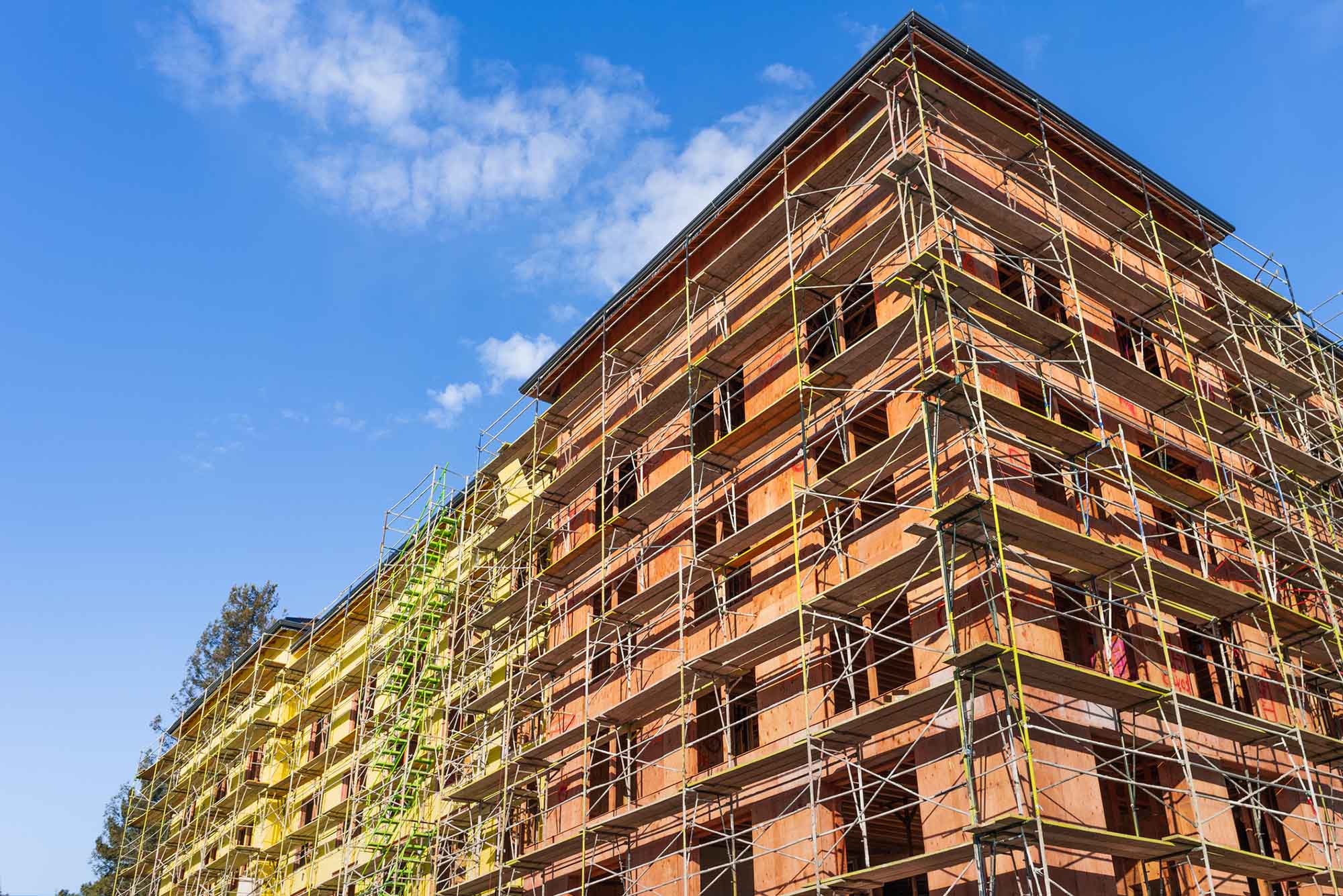How Do We Solve America’s Affordable Housing Crisis? BU Research Helps Inspire a Federal Bill That Suggests Answers

The United States doesn’t have enough housing to meet demand, says Katherine Levine Einstein, in part because local rules and regulations get weaponized to block new construction. Photo by iStock/Sundry Photography
How Do We Solve America’s Affordable Housing Crisis? BU Research Helps Inspire a Federal Bill That Suggests Answers
Legislation could curtail ability of strict local zoning regulations and outspoken “not in my backyard” residents to block multifamily housing
If you’re looking for somewhere to live in Greater Boston that won’t break the bank, good luck. The average single-family home price recently topped $950,000. Think renting is better? A one-bedroom apartment will set you back about $3,000 a month, or $36,000 for one year.

Even leaving Massachusetts might not help—the affordable housing crisis isn’t limited to the Bay State. Nationwide, high costs and a lack of inventory have left nearly half of Americans worried about the availability of affordable housing where they live, according to the Pew Research Center. It’s particularly punishing for low-income Americans.
A new federal bill, introduced by Senator John Fetterman (D-Pa.) and Representative Lisa Blunt Rochester (D-Del.), aims to solve the crisis by making it easier to peel back local rules that can block new construction—and that are often weaponized by those who don’t want new housing in their backyards. And the bill’s approach was inspired, in part, by Boston University research.
In a press release announcing the Reducing Regulatory Barriers to Housing Act, Fetterman’s office says the “legislation would empower local and state governments to address regulatory barriers to increasing the housing supply.” That release also quotes BU political scientist Katherine Levine Einstein.
She’s the coauthor of Neighborhood Defenders: Participatory Politics and America’s Housing Crisis (Cambridge University Press, 2019), which examines how a minority of vocal opponents use local development and zoning rules to block multifamily housing. Among those who read the book was the legislative assistant in Fetterman’s office who helped draft the legislation. She told Einstein the book inspired her ideas on tackling the affordable housing crisis and that she’d read it extensively when writing a college thesis on the topic.
“One of the key drivers of rising housing costs in the United States is that we haven’t built enough housing to meet demand,” says Einstein, a BU College of Arts & Sciences associate professor of political science. “And one of the key reasons that we’re not building enough housing is because of the variety of local land use regulations and zoning policies. What this piece of legislation is really trying to do is to provide federal support incentives for local governments to get rid of those barriers.”
Neighborhood Defenders was coauthored with Einstein’s fellow BU political scientists, David M. Glick and Maxwell Palmer.
Since publishing the book, Einstein and her colleagues have continued exploring local decision-making, particularly around housing. They’ve studied whether moving public meetings to Zoom encourages a broader range of participants (it doesn’t) and examined the restrictions that are often attached to affordable housing, potentially limiting its accessibility. Einstein is also an associate director at the BU Initiative on Cities, where she helps lead an annual survey of US mayors.
The Brink spoke with Einstein about the new federal bill, how it might improve access to affordable housing, and how we reached this point of crisis.
Q&A
with Katherine Levine Einstein
The Brink: Where do you see traces of your own work and research in the bill?
Einstein: In 2019, we published a book that really explored how regulatory policies are making it incredibly difficult to build new housing. And, specifically, we looked at procedural requirements to have public participation [in housing-related meetings] and the way that [participation] empowers an unrepresentative group of people to stop and delay new housing. I think the pieces in the bill that are really trying to get rid of and streamline these local land use regulations, and focus instead on what is called “as of right” development—where development can happen without going through these lengthy public processes—is really consistent with our work, which is showing that our current regulatory environment is fundamentally broken.
The Brink: The town of Milton, Mass., is embroiled in a conflict with the state over affordable housing rules. I could imagine some residents there might argue this bill sounds undemocratic, that it takes away their right to be involved in local housing decisions. How do you respond to that or how does the bill account for that?
Einstein: The idea here is not necessarily to totally get rid of local control of land use. Right now, we have a system in most communities where when someone wants to propose building more than one unit of housing, any kind of multifamily housing, it has to go through an incredibly limiting process with public review. And I think what policies like this one are saying is that we need to instead have more streamlined policy—not policies that completely take power away from local governments, but instead say to local governments, you need to set your policy so that we can build more housing to meet demand, and to not have this really discretionary and unpredictable process. This is not a bill that erodes local control over land use.
The Brink: What research underpins your book, how did you go about it?
One thing we did is read thousands of pages of meeting minutes for planning and zoning board meetings across over 100 communities in Massachusetts, basically looking at who participated in these public meetings about the development of new housing. We did a lot of administrative data analysis to show that the people who show up to these public meetings are very unrepresentative of their broader community. They’re privileged in a variety of dimensions: they’re older, more likely to be white, more likely to be homeowners. And they also were overwhelmingly opposed to the construction of new housing. We also analyzed land use regulations and their connections with housing construction and prices. We interviewed developers. We tackled this from a variety of different angles, analyzing community, government, and private sector voices.
The Brink: Based on that, what do you like about the bill and are there other things you wish it also had in it?
I’m really enthusiastic about the federal government providing resources and incentives for local governments to streamline their local land use regulations. I think this is a place where we cannot expect each local government to voluntarily do this on their own. It’s a really hard thing to do. Even if a local government wants to reform its land use and zoning policies, a lot of times they might lack the resources and the capacity to be able to do so.
I think within the political context we are in, in this country, the bill is doing as much as it can. Of course, I have my pie-in-the-sky other things that, if I were designing my ideal legislation, I might add. But I recognize that we live in a world with a lot of different political constraints. It does a really good job of proposing something ambitious, while understanding those broader constraints.
The Brink: You’re very involved in the BU Initiative on Cities and its Menino Survey of Mayors. Will local leaders welcome this bill or are they going to push back on it—or might that depend on where they sit on the political spectrum?
It depends on where they sit on the political spectrum. You raised Milton earlier, I don’t know that their current government is going to be super excited about a policy like this. But I think there are a lot of local governments across a wide swath of the country [that will be]; this is not just something that’s going to appeal to high-cost coastal cities. I don’t think it’s an accident that someone like Senator Fetterman is thinking about this—high housing costs and zoning being an obstacle to addressing our housing issues is not just something that’s affecting big coastal cities, it’s also something that is shaping our rural areas. There are a lot of different communities that may benefit from this and see this as attractive, that the federal government is providing resources, capacity, and technical assistance to support these zoning reform efforts.
The Brink: Have you heard of other instances where your research has influenced lawmakers or laws before? Do you speak regularly to policymakers?
One of the things that both I and my coauthors find most gratifying as researchers is if we do something that can positively benefit the broader world and not just speak to narrow academic audiences. As part of that commitment, we regularly speak with local nonprofit groups, community development corporations, advocacy groups, and local and state policymakers. Our work has been cited in places like Boston City Council policies and testimony, and we’ve testified at the Massachusetts State House. We’re thrilled that policymakers at all levels of government have found something useful in our research in thinking about how to tackle the housing crisis.
The Brink: In Greater Boston, the average single-family home now costs almost $1 million. How did we get into this affordable housing crisis?
There are a lot of different things that have gone into it, so I don’t want to propose one single explanation. But I think a lot of the groundwork for this crisis was really laid in the ’70s, when we started creating a lot of regulatory barriers to building new housing, and we just stopped building enough housing to meet demand. Particularly in places like Massachusetts and California, we saw lots and lots of job growth, but we didn’t see the growth in housing units to match that. And so if you have a lot of people coming to a place who have economic resources, because they have jobs, and you don’t build enough housing, it makes mathematical sense that you’re going to end up in a situation where the housing becomes really, really expensive. The best way we can address this crisis is to start trying to build housing to try to meet that demand and to bring prices down. When you’ve underbuilt for decades, this is not a problem that you can fix overnight.
The Brink: How do you rate the bill’s chances of success?
I am not a congressional prognosticator, so your guess is as good as mine! I think it maybe has a better chance than some other pieces of legislation, in part because housing policy has not become polarized along partisan lines the way a lot of other policies have been. And this is the kind of bill—we’ll see what happens—that could attract both Democratic and Republican support. We see legislation like this at the state level—Montana, which has a Republican governor, actually proposed some of the most ambitious housing legislation in the country. Obviously, getting legislation passed is really hard, and a lot of people are really attached to local control over land use and not seeing sweeping changes that would make it easier to build new housing, so that will always be an obstacle to this kind of legislation. I’m cautiously optimistic.
This conversation was edited for length and clarity.

Comments & Discussion
Boston University moderates comments to facilitate an informed, substantive, civil conversation. Abusive, profane, self-promotional, misleading, incoherent or off-topic comments will be rejected. Moderators are staffed during regular business hours (EST) and can only accept comments written in English. Statistics or facts must include a citation or a link to the citation.